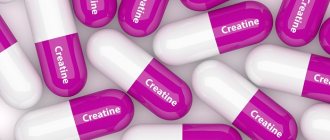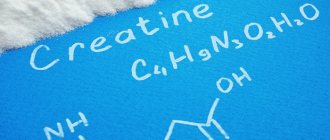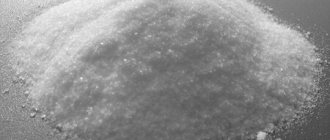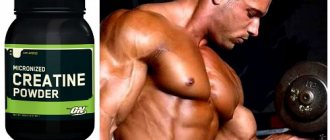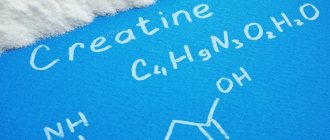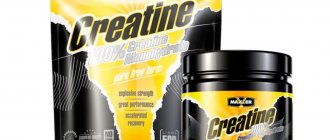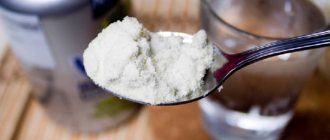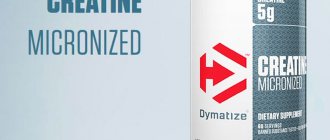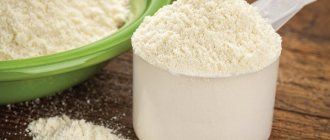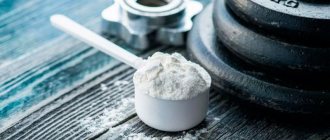Cutting is one of the most important stages of sports training for any bodybuilder who is interested in reducing body fat, body weight and defining muscles. This stage requires a decrease in the total calorie content of food, as well as longer endurance training. Nothing will give your muscles more endurance and strength than creatine. But is creatine necessary for cutting?
Creatine and fat burner. Bad combination
It is a well-known fact that fat burners help you lose excess weight.
Fat burner and creatine will not give you side effects if you use them at the same time. In general, creatine, due to its natural origin, can be combined with many products. However, this technique is not entirely advisable, since creatine’s main property is water retention in muscle cells. If you want to lose weight, then monohydrate is not the drug that will help you with this. When losing weight, it is best to use a fat burner separately from creatine. The simultaneous use of two drugs interferes with the action of each other, or rather leads to meaningless use. You can first take a course of a fat burner, and then start taking creatine. L-carnitine is known to be taken to increase endurance and improve fat burning. On the one hand, carnitine has nothing to do with muscle tissue, so you can take two drugs calmly. But again the question arises as to the appropriateness of such a combination. There will be no side effect from such a duet, however, there will be no effective result either. Therefore, decide for yourself what is more important to you at the moment: burn fat or increase strength. By the way, l-carnitine combines better with carbohydrates and not with creatine.
Side effects
The drug itself is safe, but side effects can be caused by the components included in the composition or by an incorrectly calculated dosage that exceeds the recommended standards.
Due to fluid retention in the muscles, swelling and dehydration of other parts of the body may occur. This can interfere with the removal of calcium from the kidneys and lead to the formation of stones. Taking the drug in large doses - up to 10 g at a time - can lead to polycystic kidney disease.
Due to the effect on muscle tissue contractions, cramps are sometimes observed; they occur not only during exercise, but also on fasting days. This side effect is observed in 4% of cases. It has been found that regular use of the drug increases the level of dihydrosterone, a powerful androgenic hormone that helps increase strength. But this hormone can trigger baldness in men prone to this problem. An increase in this hormone will not affect people with thick hair in any way; we are talking only about those who had receding hairline before taking it.
Functions of creatine
We are not the first to ask this question. In particular, Anthony Almada, in 1994, just conducted research that proved that the positive increase in “dry” mass due to creatine is significant, and the extra kilo of liquid is also blown away, just as it appears during a pause in cyclic intake. In addition, the scientist and his followers, in the course of further experiments, also discovered the potential effect of the drug on enhancing the productivity of training. In principle, this is a logical fact, given that, as a component of skeletal muscles, it affects energy exchange in muscles and nerve tissues.
What benefits does creatine monohydrate provide during cutting and other forms of this substance to athletes who use them?
An increase in power, performance, and strength indicators occurs due to an increase in the concentration of ATP. Of course, only within reasonable limits, this does not mean that now you can start working suddenly with heavy weights, but the difference will still be obvious. By the way, this also helps to increase “dry” mass, because muscles can work in an enhanced mode, contracting to their peak capabilities.
Improvement in relief is a contradictory, but still a fact. Many athletes like the hydration effect of the supplement on muscle cells, which significantly increases their size. The muscles seem fuller, rounder, more pumped up. And although, at Mr. Olympia, the jury may not perceive this fact as a victory, your body will certainly become the object of envy and desire on the beach.
By the way, again, it has been experimentally proven that muscle hydration enhances protein synthesis and inhibits its breakdown.
Buffering of lactic acid is one of the most pleasant aspects that creatine supplementation provides during cutting for athletes who practice intense strength training.
Stimulation of the production of anabolic hormones - somatotropin, testosterone, insulin, suppression of myostatin, in response to load training.
In addition, by taking creatine, you reduce:
Cholesterol
Level of inflammatory reactions
Risk of developing neuromuscular disorders
Consequences of cardiovascular diseases
And there can’t even be any doubt whether vegetarians need creatine when cutting. Of course, this option in the form of a supplement is the most optimal for them, since by refusing meat, they are actually deprived of one of the most valuable sources of this substance, and, accordingly, they lower their athletic capabilities several levels down at once, without using the body’s full potential.
How to take for weight loss
There are certain dosages regarding the use of creatine monohydrate for the purpose of losing weight. Don’t think that such a supplement will only build muscle mass! Correctly determining the daily dosage of the substance for men, women and girls will significantly increase their endurance, allow them to perform workouts with greater impact and, therefore, speed up the process of burning fat.
For girls and women
The problem for the fair sex is that even when losing weight, they do not “give all their best” in training. This happens due to natural restraining factors - by nature, women/girls have an instinct for self-preservation and maintaining health.
Therefore, at a certain point in the training, the body “turns on” restrictions and the woman/girl is not able to perform all the necessary loads. That is why it is advisable for them to take 4 g of creatine monohydrate per day.
It should be understood that body weight is unlikely to begin to decrease actively and immediately. Most likely, this indicator will remain the same or move downward, but not significantly. And this is due to the ability of creatine to accumulate fluid in the body.
Experts recommend that women not pay any attention to this nuance when losing weight - after a course of intense training lasting 1-2 months while taking creatine monohydrate, you can quickly get rid of edema.
For men
Men can train intensively on their own while losing weight, but it is the substance in question that will help speed up the process of forming a sculpted body. Representatives of the stronger half of humanity can take 5 g of creatine supplements daily for 2-3 months. But there is a more complex scheme:
- for the first 5 days, take 20 g of the supplement per day,
- each subsequent day, starting from 6, the dosage is reduced by 1 g,
- minimum daily dose – 4 g.
Some doctors believe that only those people who have been involved in sports for a long time and intensely should use supplements with creatine monohydrate. It is generally useless for weight loss and may even be harmful to health. However, this is only a version - the effect of creatine on the processes of building muscle mass and losing weight is still being studied.
Watch this video on how to take creatine:
https://youtube.com/watch?v=L6Lrw6G-JjE%27
What are the health benefits of creatine?
Creatine not only improves strength and endurance, but also has positive effects on the body in the long term. As Bret Contreras, Ph.D. in sports science, puts it, “The supplement that is most effective at building muscle mass is the one that is best at preserving muscle during a calorie deficit.”
Although creatine has gained a reputation as an essential sports nutrition for muscle growth, it is, in fact, a vitamin in all but name. Creatine has cardio- and neuroprotective effects on the human body. It also acts as a powerful antioxidant.
1. Beneficial effects on heart health. Taking creatine increases the activity of myocardial and endothelial cells, normalizes blood pressure and reduces the risk of ischemia and atherosclerosis. In other words, creatine, like ashwagandha, will protect you from the cause of the main mortality in the world: cardiovascular diseases. They kill 17.5 million people every year.
2.Supports brain function . People don't usually say the words "neuroprotection" and "creatine" in the same sentence. But they are wrong. Neuroprotection is any method that slows or prevents damage to brain tissue and neurons. It plays an important role in neuroscience. A lack of creatine can cause serious health problems.
It must be remembered that each person is individual. The body will react differently to the weight loss process. Therefore, the question “how to take creatine” should also be approached individually in each case. The main thing is to remember that energy deficiency and decreased carbohydrate metabolism are key factors in the development of degenerative brain diseases.
3. Cellular energy. It is a key element of oxidative stress. This is a process in which cells become damaged due to oxidation. But whey creatine can have a positive effect. This sports supplement reduces the risk of cell death. In other words, a healthy person has healthy cells.
Of course, the beneficial properties of creatine do not end there. There are many more of them. But now you know why you need to take creatine. It’s worth stopping saying that this sports supplement has only one purpose.
Precautions for use
Using creatine as a sports supplement has a number of points to consider:
- be sure to take the drug cyclically, i.e. you should take breaks in courses;
- You should not exceed the dosage of the drug and prescribe maximum doses for yourself for the “best” effect, since the body at very high doses will stop producing creatine on its own;
- increasing the dosage leads to addiction, which hinders progress in training and strength indicators;
- do not take the drug on an empty stomach - this way you can cause indigestion and mistakenly take it for intolerance to the creatine supplement;
- pregnancy is not a strict contraindication for use, but you should definitely consult a doctor, as well as for the lactation period;
- Taking the drug at the age of 50+ may cause a slight increase in blood pressure, so women in this age group should closely monitor their health.
Contraindications
Creatine monohydrate powder is the most researched dietary supplement. Researchers in the field of biochemistry claim that it has no harmful effects on the body. But this does not exclude individual reactions to individual components.
It is not recommended to use if you have:
- allergic reactions;
- hormonal imbalances;
- asthma or difficulty breathing;
- thyroid diseases;
- pregnancy or lactation;
- chronic kidney or liver disease;
Chronic stomach diseases may worsen due to insufficient water intake while taking the supplement. Digestive disorders can lead to indigestion, cramps, intestinal colic, or persistent nausea.
In addition, people with acne often experience an increase in the number of breakouts. Such complications can only occur in the event of a sharp increase in dosage or taking expired products.
Creatine use is contraindicated for minors.
Instructions for use
Scheme
There is a loading reception scheme (the so-called loading) and a classic one.
Loading
After the period expires, return to the loading phase or rest for a month.
Classic regimen
3 g daily for a month, then a month of rest.
If earlier experts recommended drinking creatine supplements according to a loading scheme, then recently there have been increasingly frequent calls to give preference to the classics.
How much to take
There is no definitive answer on how much creatine to take per day. There have been no cases of overdoses, so no one can say the upper limit. It is believed that muscles are simply not able to absorb more than 30 g per day. But 30 g is too much. The most correct option is to follow the instructions included with the drug. The dosages indicated in it can be adjusted only with the permission of a trainer or doctor!
For comparison, what intake of creatine monohydrate is recommended by different manufacturers.
Ultimate Nutrition (Creatine Monohydrate)
Single dose: 1 tsp. (=5 g).
What to dissolve in: 150 ml of water, grape or apple juice.
How often: 4 times a day for 5 days. Next - 1-2 times a day.
Course: 1 month. You can repeat in a week.
Optimum Nutrition (Creatine Monohydrate)
Single dose: 2 capsules (=5 g).
What to drink with it: add to gainers or energy drinks.
How often: 4-6 times a day for 5 days. Next - 2 times a day, 1 capsule.
When to take
There is no clear answer to the question of when exactly to take a creatine supplement - before or after a workout. On the one hand, use before class is justified. This technique will supply the body with the necessary energy to increase the effectiveness of the upcoming loads. On the other hand, knowing about the restorative properties of this acid, nothing prevents you from drinking the drug immediately after training. This will help relieve stress from the body and speed up regeneration processes.
There are even manufacturers who prescribe in the instructions the possibility of using their product during the training process in order to perk up when your strength is running low and extend the time.
Here you should proceed from what is more important for the student. If you have energy, drink before training (half an hour before) or during. If muscle recovery - after. The method of application will also play an important role. For example, it is inconvenient to carry a jar of powder with you, because you do not always have liquid on hand to dilute it. And other forms of creatine are not as concentrated and effective.
One important recommendation: do not take creatine dietary supplements at night, as they have a small but still energetic effect, increasing performance. This can lead to insomnia or restless, interrupted sleep.
https://youtube.com/watch?v=wlkAFAax3X4
What should I take it with?
First, you need to say that the drug comes in the form of tablets or powder. It can be mixed with many liquids, it all depends on taste preferences. Most often, the tablets are taken with non-carbonated water or juice.
As for powder, there are many more options: water, juice, yogurt, milk, kefir, fermented baked milk and coffee. The only thing you cannot mix the drug with is alcohol. Its effect on the liver in conjunction with alcohol can have an unpredictable effect on the body and lead to many disorders.
There is a separate type of taking creatine - taking it together with fat burners. The non-protein nitrogen supplement itself does not interact with other substances. Many athletes take the drug in combination with fat burners, because the former give strength for training, and the latter burn fat 2 times more effectively.
The combination of creatine and protein supplements leads to severe dehydration of the body, so you need to drink a lot of water (up to 3 liters per day).
If we talk about food products with which it is recommended to use the drug, then these are:
- lean fish;
- citrus;
- chicken's meat;
- low fat dairy products;
- porridge;
- green vegetables;
It is forbidden to drink the supplement while taking medications for stomach ulcers and gout.
What it is
From a biochemical point of view, creatine is a nitrogen-containing carboxylic acid present in vertebrate organisms and is actively involved in the energy metabolism of muscle and nerve cells. In some sources it may be listed as 2-(methylguanidino)-ethanoic acid. Since it was first isolated from skeletal muscle, it was given a name that goes back to the ancient Greek “κρέας”, which translates as “meat”.
This is one of the vital nutrients for the body, which rightfully ranks with proteins, fats, carbohydrates, vitamins and minerals. Its synthesis involves:
- aminoacetic acid (glycine);
- 2-amino-5-guanidinepentanoic acid (arginine);
- methionine (α-amino acid);
- enzymes: glycine amidinotransferase, guanidine acetate methyltransferase, methionine adenosyltransferase;
- creatine phosphoric acid (phosphocreatine, creatine phosphate);
- creatine phosphokinase (creatine kinase).
Enzymes that promote creatine synthesis work primarily in the liver, pancreas and kidneys. Therefore, creatine is produced in these organs, after which it is transported through the bloodstream into muscle tissue. About 95% (about 100-140 g in total in the body) is found in skeletal muscles.
It is an ergogenic component of many supplements that are produced as sports nutrition. The main indications for taking it in this status are increasing strength, increasing endurance, and building muscle mass. It is in great demand, as its effectiveness and safety for health have been scientifically proven and confirmed by a large number of studies.
Chemical formula: C₄H₉N₃O₂.
Structural formula:
Does creatine cause baldness?
Not long ago, there were rumors that creatine helps increase levels of dihydrotestosterone, a more powerful androgen that is involved in energy production (good), and also contributes to hair loss in certain categories of men and the development of prostate cancer (bad). Those with plenty of hair on their heads need not worry about an increase in dihydrotestosterone levels, but people prone to baldness may actually feel the rate of baldness increase when taking creatine supplements. At the same time, speaking about baldness and its connection with creatine supplements, it is worth noting that no clinical studies have been conducted on this topic. And even though dihydrotestosterone itself is the enemy of hair follicles, creatine accumulated in them in this situation performs a protective cellular function. The specific effect of creatine supplements on men prone to hair loss has not been studied.
It is logical to assume that creatine negatively affects the rate of baldness, but how and how negatively is unclear.
Is creatine harmful to health?
I would like to introduce you to the most common side effects.
- Water retention in the body does not cause any harm. Creatine has osmotic activity. While taking it, fluid retention occurs. In this case, the person does not experience edema, i.e. This cannot be determined by eye. After discontinuation of the supplement, slight weight loss occurs. An increase in fluid in the body is normal. Because most of it goes into the muscles.
- Dehydration - this effect occurs during drying in bodybuilders with the help of drugs that remove fluid.
During administration, the fluid accumulated by creatine passes into the muscles. Other organs and systems experience a lack of fluid. Therefore, it is very important to take enough water.When cutting, it is better to simply stop taking creatine.
- Indigestion is a side effect of taking large amounts of the supplement. There may be cramping, abdominal pain and diarrhea. This is due to the fact that the additive crystals are poorly soluble.
- Cramps, spasms, acne and pimples are extremely rare occurrences. There are no clinical studies proving a direct connection with creatine.
Creatine has been clinically proven to have no harmful effects on the kidneys or liver. It is also safe for the heart and non-carcinogenic. Does not affect blood pressure. Often the cause of side effects is an expired supplement.
Myths about the side effects of creatine
There are many myths associated with the substance in question; many people mistake it for a harmful steroid, but this is not true at all! This is a natural substance that, even when consumed in large quantities, does not cause harm to health. In addition, scientists and doctors have successfully debunked other myths about creatine:
- negatively affects the kidneys - if this paired organ is healthy, then it is not exposed to harmful effects even with long-term use of supplements,
- periodic muscle cramps occur - during scientific experiments it was found that creatine helps to eliminate this syndrome.
It is reliably known that carboxylic acid:
- not addictive
- does not have a harmful effect on the heart,
- does not provoke infertility,
- does not affect potency,
- does not have carcinogenic effects.
Creatine monohydrate during weight loss can only be used by those people who are actively involved in sports. In this case, proper use of the supplement will speed up the process of burning fat deposits and help shape the body by building muscle mass.
Possible complications
The biggest problem that can arise when taking creatine as a supplement is dehydration. But this is only possible if drying is carried out while taking diuretics - this is what many people do in an attempt to remove accumulated fluid. Experts recommend solving this problem by drinking large amounts of water - at least 3 liters per day.
In addition, in some cases, digestive disorders are noted - severe intestinal colic, cramps, and diarrhea are disturbing. This side effect occurs due to a specially increased daily dosage or a small amount of water consumed.
There is evidence that while taking creatine monohydrate for weight loss, people experience acne, facial pimples, and even cramps. But no connection was found between the supplement and the described health problems during the studies. Such complications can only be explained by the use of an expired drug.
Creatine when cutting. Creatine for cutting
To achieve their goals, athletes take various sports supplements. Amateurs who want to get rid of excess fat most often use creatine. Its benefit lies not only in stimulating the growth of lean muscle mass without fat, but also in the fact that thanks to the supplement, endurance and strength levels increase.
Creatine, as a rule, is used during periods of muscle gain, but those who are drying also drink the supplement. Beginners who have recently started training and have no experience with taking sports supplements are interested in the question of whether it is possible to take it during the period of building up their relief.
Is it possible to take creatine while losing weight?
Research shows creatine's ability to retain water in the body. The fat burning process does not change after taking the supplement, but the accumulated fluid prevents the formation of relief.
The reasons why creatine is taken while cutting is that the supplement:
- increases endurance during training, and, therefore, allows you to burn more calories;
- helps increase strength during the drying period, which allows you to continue training and withstand loads when the changed diet cannot replenish energy;
- promotes the growth of muscle mass without fat, which is almost impossible to do without taking creatine, since you cannot lose weight and gain muscle at the same time, but the supplement minimizes volume loss.
There is only one downside to creatine - the supplement retains fluid in the muscles. This drawback is of importance only for those who are preparing to perform in competitions. For athletes who want to get rid of excess fat, that is, to get lean, this aspect is insignificant. The water will go away immediately after stopping creatine.
How to properly take creatine while cutting
The supplement is available in a variety of forms. The most effective is monohydrate. It is recommended to use it both during cutting and during the period of gaining muscle mass. The daily intake of the supplement is 5 grams.
This is not the only way to take creatine. It can be consumed using a load, when the first five days you take 20 grams, and then reduce the rate to 3-4 grams. As recent scientific research has shown, the body is not able to absorb more than 5 g per day, and, therefore, drinking the supplement in large quantities is not advisable.
Creatine consumed during cutting can also be taken with other supplements. These can be amino acid complexes (it is better to choose BCAA), proteins, fat burners, pre-workouts, and so on. The supplement is not recommended to be used simultaneously with caffeine. Substances do not combine with each other, but conflict. There are exceptions, but this information should be read in a separate article.
Summarizing
Creatine is useful during the cutting period and helps you continue to train and maintain strength. The supplement stimulates the process of fat burning while preserving muscle mass, which is simply impossible to do without taking the drug. In addition, thanks to creatine, performance during exercise improves. It should be borne in mind that when weighing, the results are practically or completely invisible. This is due to water retention, but after stopping creatine, when the fluid is gone, the effect of the lost fat will be reflected in weight.
Types and forms of release
The modern sports nutrition market is diverse.
Among the types of creatine are:
- Creatine monohydrate
- Citrate
- Phosphate
- Tartrate
- Malate
- titrate
- Alkylated
- Buffered
- Magnesium
This is an incomplete list, which is expanding every year, because manufacturers are constantly looking for a panacea for their consumers.
However, most scientific studies have been conducted on creatine monohydrate.
This is the most studied type, and also the cheapest, so all the beneficial properties that you read about on the Internet relate specifically to the monohydrate.
Science has yet to prove (or disprove) the beneficial qualities of other types of creatine. In the meantime, buyers have to take the manufacturers’ word for it.
According to the form of release, they are distinguished:
- Powder
- Tablets (including effervescent, instant)
- Capsules
- Liquid
Each of these forms has its advantages and disadvantages. But in general, their performance is approximately the same, so the choice depends on ease of use and price preferences.
What do we know about creatine and what is it for?
Since creatine is actively used by athletes, it means it really works. And here are the positive effects it has:
- Increase in strength indicators.
When an athlete performs exercises that require special energy expenditure, the need for a nucleotide such as adenosine triphosphate increases sharply. It is a universal source of energy. In order for muscles to work as hard as possible, the supply of ATP must be constantly replenished. How can this be done? That's right, adding creatine as a food supplement. After this, the level of adenosine phosphate nucleotide will be normal, and the endurance and strength of muscle tissue will increase.
Increased muscle volume.
Bodybuilders know that with the help of creatine they can increase their strength, since the volume of muscle tissue increases with proper intake of the substance. It often happens that dry mass increases by several kilograms. And this is in just thirty days of admission! This is simply an excellent result! The main thing is to focus on a balanced diet and regularly visit the gym. Recent research has shown that an athlete can increase athletic performance in just a week of taking creatine! However, this is more the exception than the rule. The main thing here is that the body is highly sensitive to creatine.
Improving muscle definition.
Creatine is directly involved in giving muscles relief. It helps fill cells with water, which is the basis. Externally, well-hydrated muscles look more attractive and powerful.
The positive qualities of creatine do not end there.
It helps reduce bad cholesterol levels, has an anti-inflammatory effect, and protects the central nervous system from disorders.
Doctors prescribe protein when it is necessary to relieve the patient from diseases that provoke muscle disorders. It is actively prescribed for heart surgery, as it has been shown to reduce cardiac arrhythmias.
What is creatine
Creatine is a biologically active substance that can be supplied with food or synthesized by the body (in the liver and pancreas) from the amino acids glycine, methionine and arginine.
This is one of the main sources of energy for muscle contraction. The greater its reserves in the muscles, the higher their performance.
In natural products, the highest creatine content is in proteins of animal origin - meat, fish, poultry, and dairy products.
With intense sports activities, the consumption rates of this substance increase. To get the required dose, you need to eat a large amount of protein foods every day, which is not always possible.
The solution to this situation for many athletes is the use of creatine in the form of a dietary supplement, as an addition to natural products.
Creatine for gaining muscle mass
Creatine is the most effective supplement for increasing muscle size. To get results as quickly as possible, you need to eat right, and also work out the training process down to the smallest detail. You won’t be able to get the effect by simply taking creatine, just like any other amino acid. When taking the substance, it is imperative to add more vitamins, minerals, protein and other components to the diet, as the need for them will increase. It is also necessary to normalize your sleep patterns. It is recommended to sleep at least eight hours so that the body is well rested after exhausting workouts.
When taken correctly, creatine can not only increase muscle gain. Endurance increases and mood improves. What else do you need for inspiration and the desire to lift more weight? In addition, the amount of lactic acid in the muscles is reduced, and the hydration of muscle cells improves.
